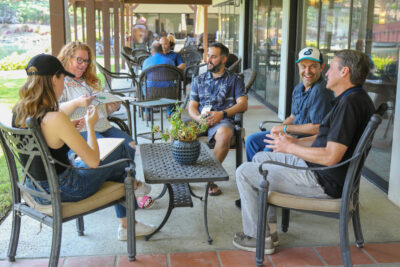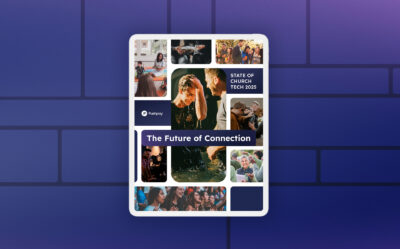
A Millennial’s Perspective on the Benefits of Generosity
There are no doubt many benefits of church generosity. Read one millennial's story about being on the receiving end of generosity.
I have benefited from extraordinarily generous people in my life. I didn’t realize quite how many until I needed to depend on them, just last year.
When the small startup I had been with for a year went through a round of layoffs, I signed up for unemployment compensation for the first time, which amounted to about 1/2 of my regular income. I battened down the hatches. I cancelled every service I subscribed to except car insurance, rent, and phone. I started shopping at the Grocery Outlet. I rebuilt my resume, assessed my career decisions to date, and started networking like crazy (that’s where the free food is). And then, my former manager called to reclaim the last remaining piece of equipment representing my relationship with the company: my laptop.
On one hand, my company had been exceedingly generous to let me continue using the laptop for as long as they had, but of course, I had hoped to move more quickly into a new job before they needed it back.
These days, a laptop and wireless access are virtual essentials. There’s always the library, I thought.
The evening before I would return the computer, my friend Lucy walked into my house with a laptop and charger and insisted I use it, free of charge until I was able to pay for it in installments. She’d just received one from her new employer, and instead of selling or keeping her personal machine, she wanted me to use it. It was a generous gift that brought me to tears.
Later in the summer, my college buddy Lisa invited me to hike for a weekend in the Northern Cascades. I had the time, and this vacation fit my budget, so I broke out my backpack, dehydrated some food, and bussed to Vancouver for under $20. She was generous with her time and attention that weekend. We talked a lot about vocation, purpose, and making tough decisions. We slept hard, hid our food from bears and mice, and swam in the icy glacier-fed lake. It was the freest I’d felt in years.
On the way down, we talked a lot about fear—deep fear. Sitting on a log eating beef jerky and trail mix, taking a break from the grueling eight miles of switchbacks, I broke down and confessed that I was afraid I wouldn’t be able to pay next month’s rent. I told her my deadline. If I didn’t have a job by a certain date, I would turn in notice to my landlords. I didn’t know what would come after that.
Lisa, who is struggling alone through many years of chronic illness, listened and cried with me. We got on our feet again, and headed down the mountain step by dusty step, back to bills and illness for her, and back to bills and job searching for me.
She dropped me at the bus station, and I settled in for the six-hour ride back to Seattle.
By the time I was on the ground in Seattle, a Facebook group had been created, and my friend had shared my need for rent money with other friends. Over the next two weeks, she collected over $1,500—enough to cover rent, plus some car repairs.
It was unbelievably hard to accept these gifts. Many were anonymous, but some came in the form of checks in the mail. It was a tango with pride and despair, to cash those checks from friends—and a few near-strangers—who had given out of their own precious resources to help me cover my rent.
But I did. Hard as it was, I couldn’t shake the feeling that it would have been disrespectful of their gifts, somehow, not to.
And the result? As I cashed those checks and accepted the freely given gifts at a time when I was dealing with a sense of failure and brokenness, generosity said I was still of value, and that this was not the end of my ability to work hard and work well.
Not only were my friends generous and kind, they were happy to give—happy to be asked to give.
People were so generous in other ways, too. I received gifts of garden vegetables, homemade jams, and cards. One friend invited me to lead an art workshop at her house, and she organized the students. Other friends purchased my paintings from an Etsy shop I opened, and some bought tickets and drove hours to attend an art showcase I worked on during my unemployed months.
At first, each new act of generosity weighed on me. I could never give back as much as I had received in time, attention, and encouragement. Around the time I was struggling with this story, a new study on Altruism took a look the question “Why do people help each other?” The research finds, unsurprisingly, that generous examples tend to inspire more generous behavior, noting that generosity seems to be more of a social behavior than an inherent tendency.
In the study, toddlers were much more likely to help if they had seen an example of a generous response to a need first. I had never considered that maybe I needed to walk this path in order to pay attention again, to be aware of needs and opportunities to give—not to pay back those who gave to me, but to be awakened to chances to give. My responses to expressed needs are different now. I’ve seen firsthand the difference it made when my needs were met in a practical way.
This study, in The Wall Street Journal also points to the social connection of giving. In evolutionary terms, it suggests…
“…we often tend to think of altruism as a kind of sophisticated moral capacity we use to squelch our urges to dominate others, this new evidence suggests that giving is actually inherently rewarding: the brain churns out a pleasurable response when we engage in it.”
But the subjects’ high degree of midbrain activation wasn’t the study’s only interesting finding. Dr. Grafman found that the subgenual area—a gumdrop-sized region near the midpoint of the brain, part of the frontal lobes—was also strongly active when his study subjects made the decision to give to charity. The area contains lots of receptors for oxytocin, a hormone that promotes social bonding. The finding suggests that altruism and social relationships are intimately connected—in part, it may be our reliance on the benefits of strong interpersonal connections that motivates us to behave unselfishly.
The connection between generosity and individual happiness is a fairly hot topic, especially at Christmas. People who give to charity, volunteer, or help others are generally happier and more socially fulfilled, but the idea of strengthening social ties—more than simply being personally fulfilled—is less-discussed. Beyond feeling a sense of satisfaction over a job well done when you bring food to the food bank or give money to a friend in need, is there deeper community to be found in being generous with one another? It sounds a bit like the church has a good idea about giving, doesn’t it?
In my story, though some of my friends remain anonymous with their gifts, a big part of the gift was the understanding that I was not alone. Some friends I hadn’t heard from in years—since high school in one case. Their generosity triggered a response in my own heart that I couldn’t have predicted. Generosity became generative—a word from the same Latin root that goes back to the word “birth.”
One more study, featured by NPR, seems to corroborate; children were introduced to a cute monkey puppet and told that a certain treat made the puppet really happy. A few minutes later, the toddlers were given a stash of treats for themselves. The responses to either receiving candy for themselves or sharing a treat with the puppet were markedly different. Children received more pleasure when giving the treat away than when they kept it for themselves, but it was a secondary finding that was most interesting. The biggest smiles for the children came “when they gave away their own treat rather than an identical treat provided by the experimenter.”
A few months after I slowly moved from freelance to full-time contract work, my hiking buddy and I had been exchanging emails. Lisa told me she was in the second bout of Pneumonia for the winter and her roommates were out of town for winter break. She felt weak and discouraged, and was finding it painful to move, much less do laundry or get groceries. Though I live 200 miles away, I didn’t sit around wondering what I should do.
First things first: she needs lunch today. I found a restaurant near her home address and ordered chicken soup on delivery (how magical the internet makes this kind of thing!).
Next, I reached out to a group of awesome church ladies who live in her city. She didn’t know them, and they don’t know her. But I asked if anyone would be willing to bring her a care package, and explained her situation. One woman delivered a box of fresh food, tissues, vitamins, tea, and several pairs of warm fluffy socks. Over the next week or two, we had healthy, comforting groceries delivered a few times.
Though Lisa had coordinated donations for me, I wasn’t just jumping at a chance to pay her back (as if I could). I simply followed her lead in willingness to ask in trust and act in faith. To be honest, I don’t know if I would have done that before.
While financial gifts can be measured in dollars and cents, Return on Investment (ROI) is the term that usually refers to a profit or benefit resulting from an investment, but it’s simply business-speak for another concept the Bible often describes using the agricultural term fruit. Does an action bear fruit? If so, pursue it even more.
I like this description better, because it speaks to the living, breathing nature of generative generosity. In Philippians chapter 4, the Apostle Paul speaks to a situation where the church members of Philippi met some of his practical needs. Paul thanks the church for meeting God’s needs, and says, “Not that I seek the gift, but I seek the fruit that increases to your credit.”
For Paul, the gifts were not the main point. He knew that God would supply his needs, but he tells the church that the ‘increasing fruit’ of their action has a deeper impact on their community than the gifts themselves. Maybe the science is showing that the early church was on to something.





